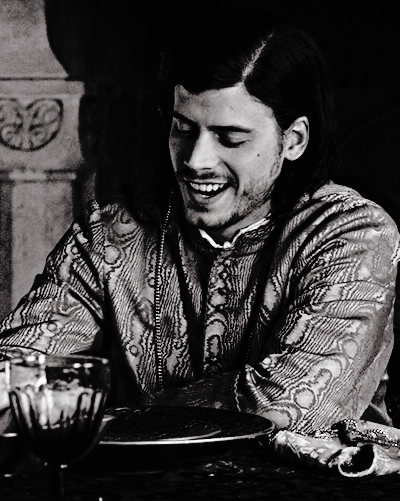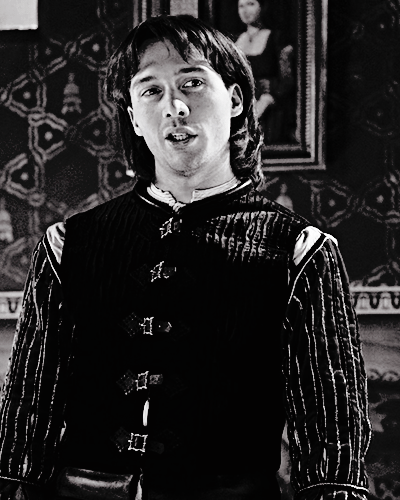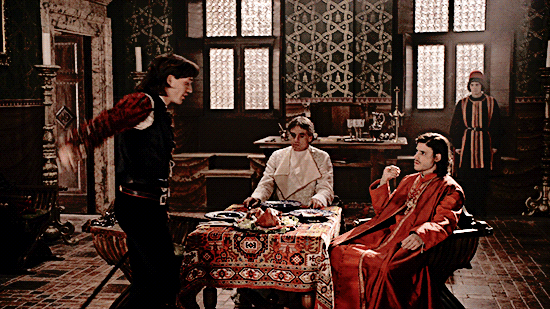#but when i say blood and beauty is the best book about the borgias???
Text






❝The Pope himself laughs at this, for his bantering sons are so clever and handsome and vital. Across the room the apprentices are giggling openly, and it is all suddenly a charming family scene. Cesare picks up his father’s cue, hugging Juan again and slapping him on the shoulder. “It is good to see you again, brother.” “You too. We have missed your sour face at court."❞
— Blood and Beauty: A Novel About the Borgias, Sarah Dunant.
#but when i say blood and beauty is the best book about the borgias???#like i'm obsessed with mario puzo's “the family” but also sarah dunant's “blood and beauty” is a gem <333#juan borgia#cesare borgia#rodrigo borgia#david oakes#francois arnaud#jeremy irons#perioddramaedit#userthing#theborgiasedit#the borgias#televisongifs#cinemapix#tvarchive#tuseraixa#davinciae#booksociety#smallscreensource#by jen
141 notes
·
View notes
Note
Why don't you like Sarah Dunant's novels about the Borgias? Being as you are a Borgia expert/fan, I'd like to know your opinions on this 2 novels, 2 novels which were hugely popular some years ago and have been praised by some Borgia historians.
Ok, so I just want to start this by saying that I haven’t read the second volume and given what @margarettudor told me about it, it doesn’t sound like something I’d want to read tbh. So this is gonna be only about the first volume: Blood&Beauty.I mean, it’s not suprising that these novels were hugely popular and praised by Borgia historians anon, given that Dunant backs their narratives about the Borgia family. Especially about Lucrezia. Dunant clearly sees Lucrezia like most, if not all Borgia historians do. It’s something that plagues Borgia historiography if you ask me. The flawed idea that the only way to rehabilitate Lucrezia’s terrible reputation, is to deny any association with the “crimes” of her family. To press hard that she was just a victim, and she never did anything wrong, ever. If Cesare and Rodrigo are usually the epitome of bad traits, Lucrezia is the epitome of good traits. Which not only is just as dehumanizing as portraying her as evil, but completely ignores the times she was living in and how she was raised, it also doesn’t match with the little evidence we have about her.She was not the poisoner of the Renaissance, (although according to a letter of Giulia Farnese, she was quite good and passionate about chemistry.) But she certainly wasn’t a passive victim either. She received the same education her brothers did, she spoke 5 languages, she had that well known Borgia allure that she deliberately used to her and her family’s advantage, and she definitely had the same mind for politics and diplomacy they had. Rodrigo and Cesare seemed to have trusted her the most with their political affairs. And then shockingly she also shared with them familiar flaws such as: callousness, shallowness, and selfishness.So coming back to Dunant’s book, to see her portraying Lucrezia as this sweet innocent girl, who is incredibly gullible and easily shocked by any imorality lool, who just wants to love and be loved, but her family, most notably her creepy, cruel brother keeps getting in the way is absurd quite honestly. Lucrezia wouldn’t have survived as long as she did if she was truly like that. And then how Dunant presents Cesare and Lucrezia’s relationship as one-sided, as Cesare being the one who is obsessed with his sister is unreal. And that has nothing to do with my shipper feelings for them. I don’t need them to be incestuous on every piece of media, especially considering they were not like that in real life.I do need however, that their relationship be a close and honest one, with mutual feelings and trust because that was pretty much the case. It is a hopeless task to keep trying to separate Lucrezia from her brother and his scheming. If there is one thing that is clear about the Borgias, is Lucrezia’s extreme closeness and loyalty towards her brother and vice-versa, and how that remained true until the very end. No matter what happened. It poses as a big obstacle for Borgia historians who are keen on the St.Lucrezia narrative and it puzzles them too, (which can be quite amusing when you read it ngl) but it is what it is. Lucrezia adored her brother, and he adored her, their complicity was such that it seems even Rodrigo was occasionally bothered by it. By all accounts they were each other’s favorite sibling, possibly because they understood each other best and had similarity in character. We don’t see that same closeness between her and Juan for example. But apart from the Lucrezia’s business, Dunant’s characterizations of the Borgia family as a whole felt dull to me. They are essentially pinned down into tropes? or the same ol’ stereotypes if you will, you have: Rodrigo, the likeable, ambitious schemer, Cesare, the-sometimes-charming-but-mostly unlikeable, dark and heartless scheamer, and then you have Lucrezia, sweet innocent lamb who’s just a pawn. There is no complexity, no depth with these characters, and mind you the whole Italian Renaissance was a complex period, full of grey areas, which it’s one of the things I love about it. You have these people who had no problem slaughtering their way to the top, even if it included their own family members, but who were also big patrons of the arts and humanities. The Malatesta family is a good example of that. Also the Baglioni to an extent. So I needed that complexity and that grey area, and it wasn’t delivered imo. It’s that simplistic portrayal of the family. After a while, it gets tiring.Those are the reasons why I’m in the opposite side of liking this book I guess. And it’s not to say is utter trash, because it isn’t. Dunant is a good writer, she has a way with words. I think that’s also why her novels were so well-received, and there are worst Borgia fiction out there. In the end I think it’s a matter of personal taste and how you perceive the Borgia family. I respect Dunant’s view, (although I find it dishonest and presumptuous how she says what she wrote is as close to real life as possible.) But my view on the family is a different one, I don’t believe neither one of them were good people™. But that doesn’t mean they were evil. Far from it. All three of them had qualities and flaws, all three of them were capable of good and bad things, and that’s what gets lost more often than not in both fiction and history. They were better/different at some things, and no worst than their contemporaries at other things. That’s what I try to find wherever I read fiction about them: balance, complexity, humanity. It is a hard task to be sure lol, but sometimes I get lucky. I hope this bible of an answer makes sense for you anon and I hope you read this before tumblr goes down lol, any other questions, feel free to ask! :))
#anon ask#ask answered#borgia thoughts#house borgia#lucrezia borgia#lucrecia borgia#cesare borgia#césar borgia#rodrigo borgia#i really tried to be as succinct as articulate as possible#but you know#maybe i failed?#lool#anyways
24 notes
·
View notes
Note
Hey, what are in your opinion the best fiction and nonfiction books about the Borgia family? And why?
Hey anon!
It took me awhile to answer this because is always a tricky question for me lol. I think I’m rather picky when it comes to them, but also I’m constantly changing my mind. Anyways here it goes:
Best:
The Poisoner Mysteries, Sara Poole: So, I must say that the main character, Francesca, can be very annoying and completely unrealistic as a woman in the 14th. But these trilogy has been my favorite so far because the Borgia family is written amazingnly well. I was suprised actually! The writer achieved such a wonderful characterizion of Cesare, a rare balance of giving him his humanity, but also acknowledging his flaws. I adore her Cesare. Her Lucrezia is fine here, didn’t bothered me, she has great dialogues. And her Rodrigo is pretty much how I see him irl. Also there’s a lot of mysteries, which I love. I just had a lot of fun reading it, it was delightful.
Fuyumi Soryo, Cesare: Il Creatore che ha distrutto: I think is brilliant how Soryo showed that serious, historical fiction about the Borgia family can be done without resorting to old clichés and sensationalistic gossip, and still make it fun and entertaining. I’m grateful for the respect and dedication her and her team have showed towards Cesare. And I just love everything about her manga. The main character, Angelo, is great. The relationship he develops with both Cesare and Miguel is so so good! The Medici family is also great here. Lucrezia is adorable! Rodrigo is again, exactly how I see him. And last but not least, the drawings! especially the coloured ones are stunning. So much detail, it’s a work of art, really.
Mario Puzo, The Family: It’s like a classic Borgia fiction, some people hate it, but I absolutely love it! If you must take advantage of all the rumors and misdeeds that surrounds the Borgia family, then I expect you should do it as masterfully as Puzo did it.
Sara Bower, Sins of the House of Borgia: I love it because 1) The main character is super relatable to me sorry not sorry lool, 2) Bower wrote Lucrezia so so well. A complex, well rounded character, that’s neither a victim nor a poisoner. Which it’s how I see her irl. Her writing is beautiful too. Those Cesare and Lucrezia’s letters had me dying!!!!! That being said, I must say that nowdays her Cesare feels ooc sometimes, and her Vannozza still feels rather harsh and unfair imo. But overall it remains a favorite of mine.
Françoise Sagan, Le Sang Doré Des Borgia: I actually haven’t read the book, but the book is basically the transcription of the tv series, which I watched and it’s my favorite Borgia adaptation! I don’t know how Sagan did it, but her Lucrezia is amazing and accurate and ughh what a queen!
Worst:
Jean Plaidy, Madonna of the Seven Hills/ Light on Lucrezia: OH MY GOD, these books are so cringely bad I think the only reason I was able to finish is because it was my first borgia fiction and even then, I suffered getting through with it. Everyone is ooc af. There is one or two good dialogues between Lucrezia and Cesare, but overall what a disaster! I still don’t understand wth the writer was thinking while she was writing that, nor how you can get the WHOLE family all wrong at the same time??? But yeah, I guess that happens sometimes idk lmaoo.
Sarah Dunant, Blood and Beauty: Listen, if you go to Goodreads, you’ll see how praised this book is. And I do admit Dunant is a good writer. However, she is on this side of my list for a very simple reason: she made me hate Lucrezia. Goddd, she tries way too hard to present Lucrezia as the good girl™, beacon of innocence and goodness, and what comes out of it is this incredibly annoying, dull and stupid character that made me roll my eyes each time I had to read her dialogues like: Oh no, more bullshit! can we just go back to Cesare and Rodrigo? their servants? Juan? Joffre? literally anyone would be more interesting to read than her Lucrezia istg. Also if you are a cesare x lucrezia shipper, just know that in order for Dunant to keep Lucrezia on this ridiculous and unrealistic pedestal, their relationship had to be sabotaged. So don’t be fooled by the hardcover copy, nor the lovely dialogues at the beginning, it gets bittesweet pretty fast. And as if all this wasn’t enough, I still had to read with my own two eyes Dunant claiming her book is as close to real life as possible. Just no. Unacceptable. I realized this ended up becoming a mini-rant, sorry anon! I just really loathe this book. It broke my confidence on Goodreads’s review system, that’s for sure.
Elena/Michela Martignoni, Cuore di Tiranno/Verdugo de Tiranos: Too sensationalistic and badly written. And it does have unnecessary violence against women. It would be one thing if they could back that up with hard evidence, which they can’t. All we have is a bunch of theories, so how their minds went where it did there is kinda disturbing imo. It’s not type of reading.
Dumas, The Borgias: Not so much for how he uses and abuses of all the Borgia alleged “sins”, but because his writing is very confusing. It’s too dry to be fiction, but it doesn’t work as non-fiction either because there are some dialogues sometimes. It’s weird and I couldn’t finish it.
Non-fiction:
So, I kinda answered this one here. I would only add that Woodward’s bio on Cesare is not too bad. I mean there were times I wanted to quit reading it, but his last chapters are ok and he offers a good amount of sources and evidence, which I always appreciate.
#ask answered#anon ask#house borgia#books#my thoughts#there are other books anon#but they're not good enough to enter best category nor so bad to enter worst imo#these are the main ones i think#i'm currently reading another one in french called la vie de césar borgia but i need to finish to really say what i thought#but it's ok so far#just know that borgia books both on fiction and historical are mess and it depends on how you see the family and personal taste i think#thanks for the ask!#i love talking about my beloved renaissance family#<333
17 notes
·
View notes